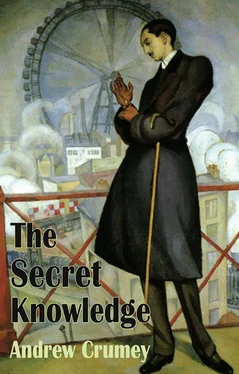Andrew Crumey
The Secret Knowledge
This work was partly supported by a grant from the Arts and Humanities Research Council, for research carried out at Newcastle University. Further work was done at St John’s College, Durham, while the author was visiting fellow at Durham Institute of Advanced Study.
Yvette has been told that the big wheel is incredible, but now that she stands before it in the park there is something comfortingly domestic about its appearance. The great metal-spoked circle is like an oversized bicycle wheel, slowly whirring its passengers upwards into amazement as they stand in the blue-painted wooden carriages dangling merrily from the revolving rim. From where she watches, Yvette is unable to make out individual faces through the glass panes of those distant compartments; instead she sees the eagerness of insects.
With the warm July sunshine on her neck, Yvette waits, pricking the shadowed gravel at her feet with the point of her folded parasol. Pierre ought to be here by now; he said noon, but the clock on the tower shows ten minutes past twelve, and among the throng of people in the park, his face remains invisible to her. What could have detained him? He has never been as late as this, his delay only confirming the ominousness she detected already in the note he sent, cryptically referring to a “matter of great significance”. It seemed an implicit proposal of marriage, now it feels more like a warning of disaster. He’s had second thoughts. He loves another.
Yvette is twenty-one and already many of her childhood friends are married. Some have children of their own. She looks once more at the big wheel, slowly depositing passengers and accepting new ones from the head of the queue that snakes far behind the pennanted ticket tent. She can make out an entire family — mother and father, three children of varying heights, a grandmother or aunt — all shuffling eagerly into the stationary compartment whose door lies open for them, while the preceding passengers leave from the far side. One day, Yvette thinks, she will be the mother. One day she will have been grandmother.
When Pierre speaks of love he mostly refers to music. He is studying at the conservatory; soon, he assures her, the name of Pierre Klauer will be known around the world. She adores hearing him speak that way, though to her untrained ear his music is unfathomable. He can play Beethoven piano sonatas with the smoothness of an expert yet in his own compositions he favours harsh rhythms, jangling discords. She has always thought of art as being a matter of beauty and refinement, but the new kind is about something else, progress and modernity, even if that means sacrificing old laws of taste. He says it is the sound of the future. She only hopes there will be room in it for her.
The wheel recommences operation, revolving at its full, stately speed. The family she saw are gliding over the top, the children shoving for a better view. Yvette can imagine the commotion inside the wooden compartment, the father’s stern injunctions to order. Her own parents know about Pierre and naturally approve of him; his father has made a fortune from factories in Germany and Pierre need never work, though he has excellent prospects as an organist or teacher in one of the best schools. Any obstacle would more likely come from Pierre’s side, since Yvette’s father is only a furniture dealer who, for all that he has achieved, is in some people’s eyes no better than a shopkeeper.
It is a long while for a woman to stand alone. Eyes have been noticing her; young men tip their hats, smile, stroke their moustaches in gestures of invitation or enquiry. So many men have passed her in these extended minutes, most with a partner or friend, but others alone, like herself, and it is only her very deliberate turning away from them — at one point even waving to an imaginary far-off Pierre — that has prevented some from speaking.
She decides to wait less conspicuously, near a row of whitewashed stalls where people are tossing hoops at upright bottles, aiming darts at targets, buying cups of lemonade. Yvette places herself at the end of the row, beside a glazed booth from which candied fruits are being sold. Sunlight shines through its yellow pane onto Yvette’s dress, dappling it with light. A butterfly, impressed by the topaz glow, flits intently about her, as if trying to suck nectar from the coloured air. Afraid at first, Yvette calms her nervousness of the darting creature and watches while it briefly keeps her company before speeding away above the bobbing hats of the chatting crowd.
Pierre speaks of a revolution in art; the kind of talk they can share as lovers, but best kept from the misunderstanding ears of parents. She has spent three weeks without seeing him, the longest separation since their relationship began — and only four letters to console her. He has been staying with friends outside Paris, working on an important composition. She has no reason to doubt him.
Three young men, common labourers by the look of them, are taking turns to fling balls at a pyramid of cans, their sleeves rolled up, perspiration gleaming on their unshaved faces. Probably here after a long night-shift but still with ox-like strength, lusting for pleasure more than sleep. One of them gives her a glance before flexing his muscular arm and sending the tins flying. What would these fellows make of the new art? Brahms and Wagner failed to save humanity; how can Pierre? Yet that is his dream: to improve the world. Revolutionary music is not enough; there has to be a change in the whole of human affairs, a modulation into a new key. If she did not know him well enough she might fear he was a communist. She wonders about his new friends.
And then at last his voice. “Yvette! Thank goodness!”
“Pierre!”
After so much waiting there is a sense of both joy and awkwardness, because although his white suit and straw hat, his black tie and the flower in his buttonhole are all familiar, she thinks he looks somehow different, as though a year has passed since they last saw each other. When he bends to kiss her hand she detects his father’s Teutonic formality; there is something new in the smile he raises from her fingertips, as though he might like to bite her. His teeth are whiter than she remembers.
“I’ve missed you, Pierre.”
“It’s wonderful to see you. Let’s walk.”
Arm in arm they stroll across the park that had become for Yvette a blur of worry. “Are you truly glad?”
“Of course!”
“But I think your mind is somewhere else.”
“It has been.”
They pause at the entrance to a tent where Pierre is distracted by the sight of a wooden dummy standing as advertisement for whatever goes on inside: a dainty female figure with a brightly painted face, like a fairy or ballet dancer, and Yvette thinks to herself, after three weeks of longing it should not be like this. He cares more about a piece of wood than about me! “Do you want to go inside?”
“What? No, it reminded me of something, that’s all.”
She can take no more. “Do you love me?”
He splutters, not sure at first if she is joking, then sees the seriousness on her face. “How can you doubt it?
“Is there another you prefer?”
He embraces her. “You know you’re everything to me.”
“Then why keep me waiting and arrive with no apology? Why be so distant?”
He looks down at his feet like a humbled schoolboy. “I’ve been working hard, creating such marvellous music.” When he raises his eyes she sees in their sparkle a vulnerability that melts her fear. “You know I’ll always have two loves, Yvette.”
Читать дальше











